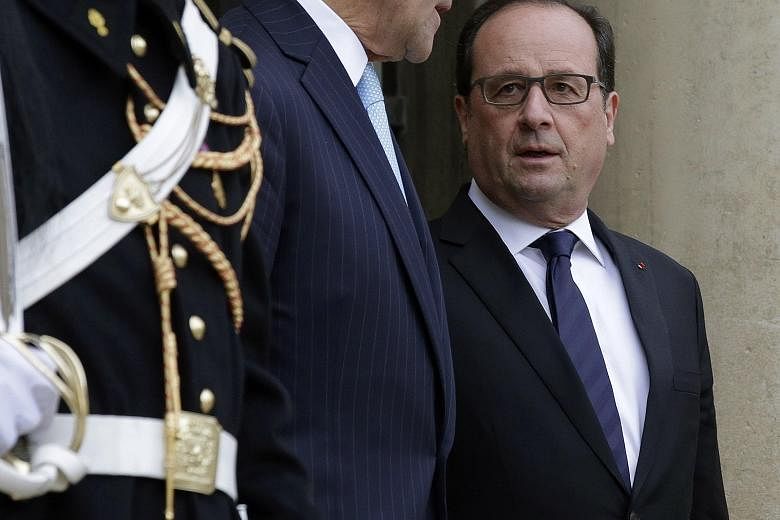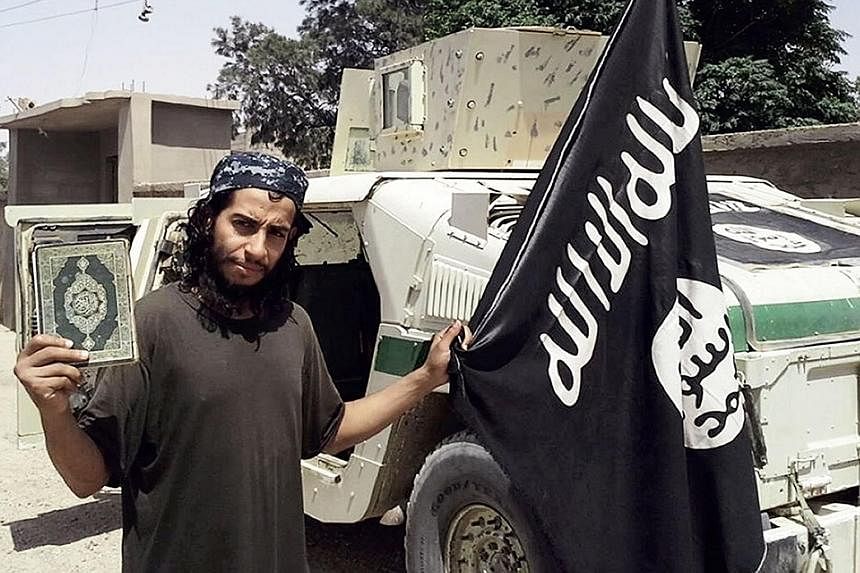LONDON • French investigators think they know who masterminded the deadliest terrorist assault in peacetime France: Abdelhamid Abaaoud, a twenty-something Belgian who joined the ranks of the Islamic State in Iraq and Syria (ISIS) a few years ago.
The son of a Moroccan shopkeeper and familiar to the intelligence community for his high-profile presence on social media, Abaaoud is being studied by investigators as the man who orchestrated the multiple attacks in Paris last Friday that left at least 129 people dead and hundreds more wounded, said the prosecutor's office.
A French official briefed on the investigation, who spoke on the condition of anonymity because he was not authorised to discuss operational details, said Abaaoud had mentioned plans to attack "a concert hall" to a French citizen who returned from Syria.
Abaaoud, this official said, had also been in contact with Ismael Omar Mostefai, one of the Paris attackers. He also knew another attacker, Ibrahim Abdeslam; they were tried together in 2010 in Belgium for a minor offence.
Abaaoud, who Le Monde newspaper said is 28 years old, is also linked by French officials to a failed assault on a Paris-bound high- speed train in August and a plot to attack a church in the city in April.
Belgian security officials began tracking him in March last year after he appeared in a video behind the wheel of a pickup truck dragging mutilated bodies to a mass grave in Syria. About six months later, photographs surfaced on the Internet indicating that he had lured his 13-year-old brother Younes to the war zone.
Like many extremists, Abaaoud leads a ghost-like existence, with investigators scarcely able to piece together an outline of his whereabouts. His trail went cold in Greece after thwarted assaults against Belgian police in January that he was accused of planning. He is believed to have returned to Syria.
Western allies sought to kill him in an air strike in the weeks before the Paris attack, but failed to find him, The Wall Street Journal reported, citing two unidentified Western security officials.
There are few clues to Abaaoud's radicalisation.
He grew up in Molenbeek, a working-class district of Brussels, where the now-banned Shariah4Belgium extremist group was particularly active in seeking recruits among disenfranchised and alienated youth. The Guardian reported that he committed several armed robberies.
His father said he was a good son whose actions have brought shame to the family.
"Why would he want to kill innocent Belgians? Our family owes everything to this country," Mr Omar Abaaoud told La Derniere Heure newspaper this year.
"Abdelhamid was not a difficult child and became a good businessman. Suddenly, he left for Syria. I wondered every day how he became radicalised to this point. I never got an answer."
In July, Abaaoud was sentenced in absentia to 20 years in prison by a Belgian court, along with 31 other extremists, for the plot to attack the police officers.
The video of Abaaoud dragging corpses comes from a cellphone found by Free Syrian Army soldiers that they gave to French journalist Etienne Huver, who spent time last year on the Turkish-Syrian border. It turned out to be Abaaoud's, and his social media presence stopped soon after all the cellphone data was released.
He re-emerged in February this year, when ISIS' English-language Dabiq magazine published what it said was an interview with him. He is referred to as Abu Umar al Baljiki and discusses the planned assault on Belgian police in January and the subsequent shoot-out in which two of his co-conspirators were killed.
Security sources were quoted by Belgian media at the time as wondering whether the interview was fake, citing contradictions in his statements. For example, he said he was in Belgium for the planned attack, but the country's Flemish-language VTM television channel reported that his phone was traced to Greece, where he may have been briefly detained by police.
BLOOMBERG, NEW YORK TIMES


